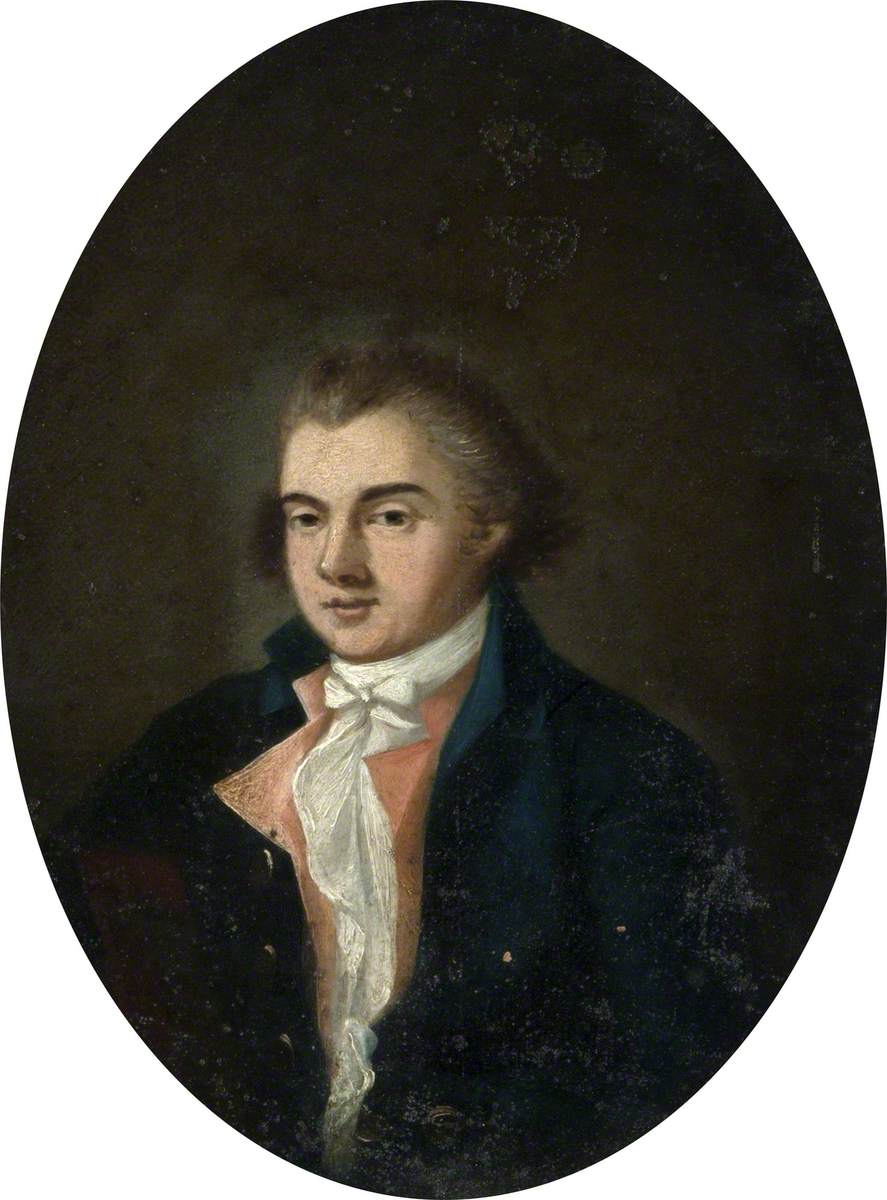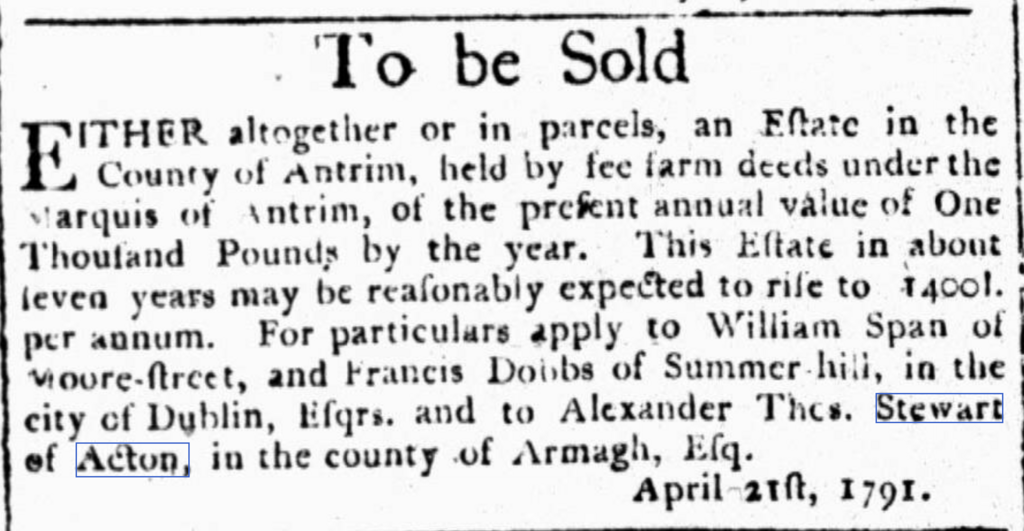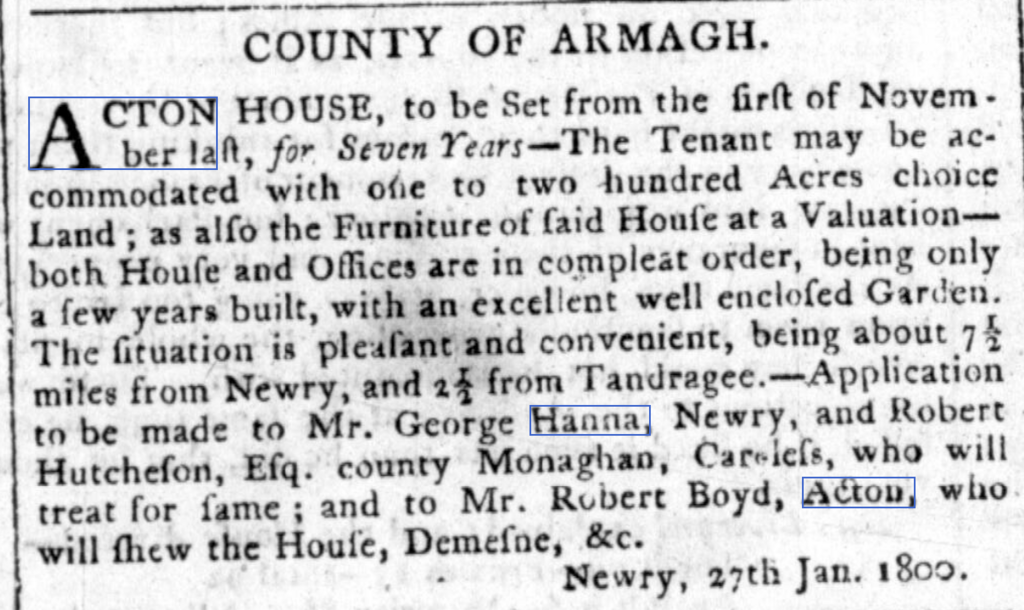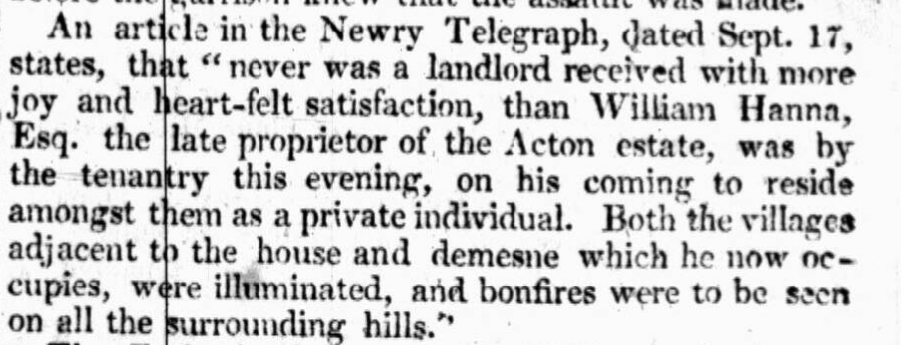There are conflicting historical accounts of which Stewart married Sarah Poyntz, and thereby brought the Acton estate into the possession of the Stewart family.
The Rev. George Hill’s “The Stewarts of Ballintoy”, written in 1865 and updated in 1900, asserts that “James and Bernarda Stewart left one son, Archibald, who married a daughter of Sir Toby Poyntz.”
However, the majority of the evidence, not least from multiple family trees in Ancestry.com, is that Sarah Poyntz married Col Charles Stewart, whose first son was called Archibald. There are other errors and inconsistencies in Hill’s account of the Stewarts.
Charles Stewart of Ballintoy (1644-1711)
Sarah Poyntz married Charles Stewart in 1675, when she was 22. They had five children – Archibald, Alexander, Jane, Frances and Rose – over a 30-year period.
After Charles Poyntz Jnr died (perhaps in 1707, the date is very uncertain) and the sisters Sarah and Christian jointly inherited the Acton estate, Sarah and her husband Charles bought Christian’s half-share for about £4,000 and so became sole owners of the Acton estate.
Not long afterwards, Charles Stewart died fighting in Spain in 1711, during the War of The Spanish Succession, and the property passed to their son Alexander when he was 31.
Alexander Stewart (ca.1682-1742)
Alexander appears infrequently in the historical record and seems to have little impact on the development of the Acton/Poyntzpass area. He married Anne Wilkie from Scotland in 1718, and they had three children in just a few years – Ann, Rose and Alexander Thomas (A.T.). All of the children seem to have been born the Stewart family seat at Ballintoy; Alexander and his family were probably absentee landlords.
Alexander died in Ballintoy in 1742, aged 62, and was succeeded by his only son, Alexander Thomas Stewart, aged just seven at the time.
The affairs of the estate seem to have taken some time to settle; on 27 April 1850 an advert appeared in the Belfast News-Letter, in which Alexander’s executors offered for sale a large number of townlands and properties in Co. Antrim.
Alexander Thomas Stewart (A.T.) Stewart Snr. (1735-1787)
We do not know who managed the affairs of the Acton estate until the young A.T. Stewart became old enough to do so. As an adult, he acquired the epithet “Graceless” due to his extravagant ways.
Like his father, A.T. Snr appears to have initially lived almost exclusively at Ballintoy, where he promoted schemes to build the harbour, and develop coal seams on his estate. These were not good investments, and about 1860 he was forced to sell his Ballintoy estate for about £20,000 and moved permanently to his other estate at Acton.
Sometime between 1775 and his death in 1787, A.T. Snr built the current Acton House, replacing the house built by his Poyntz ancestors in 1619; it was the third house to stand on the site.
He was High Sheriff of Co Antrim in 1762.
Alexander Thomas (A.T.) Stewart Jnr. (???-ca. 1799)

A.T. Jnr inherited the Acton estate from his father in ……. Hill (1865) summarises him thus:
“…might also have been appropriately named Graceless, as he lived riotously, mortgaged the family property and died in poverty…about the year 1799. He was unmarried, and with him ended the main line of the family.”
William Blacker of Carrick (the famous Orangeman) wrote:
“Mr. Stewart was in early life a young gentleman of refined manners and great kindness of disposition – he unfortunately steered to leeward of morality in his domestic arrangement, was led into gambling and involved himself deeply. Things had come to their worst with him about the year 1796 or 1797, when like many other men of broken fortunes whom we read of, he began to look to rebellion as one mode of getting out of his difficulties and he leagued himself with Lord Cloncurry…I remember him giving evidence at the Armagh assizes of ‘97 in terms highly laudatory of the United Irishmen though at the first formation of the militia he held a Captain’s commission and was for a very short time a Major in our regiment.”
In about 1790, Stewart was forced to mortgage the Acton Estate to pay off his gambling debts. He was lent the money by Samuel Hanna, a wealthy merchant from Newry. Thus ended the Stewarts’ tenure of the Acton estate, as well as any remaining connection with the Poyntz family.

The money that A T Jnr raised from Hanna may not have been enough to cover his debts and fund his lifestyle, as in early 1791 he was trying to sell off some of the Stewart ancestral lands in Co Antrim.
Samuel Hanna (1758-1798) & William Hanna (ca.1785-ca.1834)
Hanna’s loan to Stewart consisted not only of an initial lump sum (presumably to pay off his immediate debts) but also regular annual payments. The mortgage terms very presciently provided that if Hanna should be substantially in arrears with these annual payments, then the whole property would immediately revert to Stewart and any remaining debt would be cancelled. Blacker’s account continued:
“At this time there was in Newry a merchant, Mr Hannah, a gentleman of large and honourably acquired property. With him Mr. Stewart entered into a treaty for the sale of his Acton property…Well, things went on smoothly enough for some time. Stuart had already given up gambling and dissipation and married. His wife was inferior to him in rank…but I believe she was a very attached and attentive wife.
In the mean time a change had taken place in the affairs of Mr Hanna, he…became a bankrupt. The day of payment of Stewart’s annuity came and passed without the cash being forthcoming. A few weeks more, I think little more than six, would have reinstated him in his nice property when it pleased God to visit him with typhus fever which carried him off and the property remained with Hannah.”
The Acton estate did not remain in Samuel Hanna’s ownership for very long. He died in London in 1798, aged about 39, and the property passed to his son William who was then aged just 13. William had had two older brothers, but they had both died as children.

Starting in 1800, numerous attempts were made to let Acton House and demesne, initially for seven years until William was no longer a minor, and decide for himself what to do with the property. Meanwhile, the rest of the estate would be generating a steady rental income.
By 1813, when William was aged about 28, the house and demesne were again being advertised to let “…for whatever term may be agreed upon.” … and again in 1815. The house was not proving popular.

William sold the estate to Maxwell Close sometime in 1817. However, he seems to have excluded Acton House from the sale, and moved there permanently in September 1823.
He died there in 1834, aged 49.